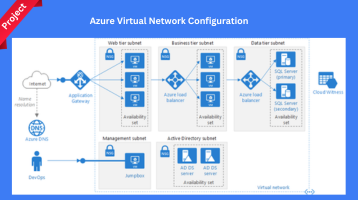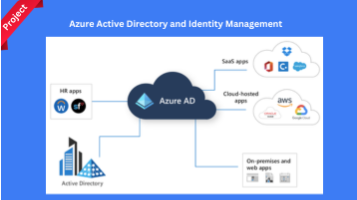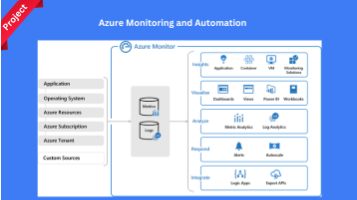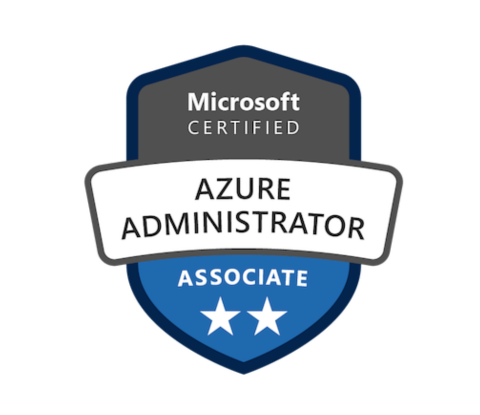Azure Administrator (Az-104) Certification Course
Acquire Crucial Azure Administration Skills in this Comprehensive Certification Course. Excel in Azure Services, Resource Management, Security, Virtual Machines, Networking, Monitoring, and Automation.
16 Modules | 60+ Lessons | 35 Hands-On Labs | Exam Preparation |
On-Job Support

Sateesh Pabbathi
Author & Cloud Expert
Course Objectives:
- Grasp Azure Fundamentals: Learn core concepts and architecture.
- Manage Resources: Create, configure, and oversee Azure resources.
- Ensure Identity and Security: Manage Azure AD and permissions.
- Deploy Virtual Machines: Handle Windows/Linux VMs efficiently.
- Configure Azure Networking: Securely connect cloud resources.
- Optimize Resource Usage: Monitor, troubleshoot, and scale effectively.
- Implement Storage Solutions: Utilize Azure storage options and backup strategies.
- Govern and Comply: Enforce policies and ensure compliance.
- Automate Operations: Employ Azure Automation and templates.
- Prepare for AZ-104 Exam: Aligns with exam skills for certification readiness.
Essential Information Before You Begin!
What is an Azure Administrator Course?
Azure Administrator refers to a role in Microsoft Azure cloud computing platform. An Azure Administrator is responsible for managing and overseeing various aspects of Azure resources and services within an organization. Their primary focus is on ensuring the efficient deployment, operation, and maintenance of Azure infrastructure while adhering to security and compliance standards.
What Are The Benefits Of this Course?
Earning the Azure Administrator certification offers career advancement, increased earning potential, and validation of your Azure administration skills. It aligns with industry demand for cloud professionals, enhances your credibility, and provides a foundation for more advanced certifications. It's a strategic investment in your career growth in the rapidly evolving world of cloud computing.
Azure Administrator Certification Course
Excel in Azure Administrator Certification for Lucrative Opportunities by Mastering These Vital 12 Core Skills
Azure Fundamentals
Governance
Identity and Access Management
Automation
PowerShell
Virtual Machines
Networking
Monitoring and Troubleshoot
Resource Management
Azure CLI
Security and Compliance
Scripting
COURSE CURRICULUM
- This chapter will introduce students to the basics of cloud computing and Azure, including the different types of cloud services, the benefits of using Azure, and the key features of Azure.
- This chapter will teach students how to create an Azure account and subscription, and how to manage their Azure resources.
- This chapter will teach students about virtual machines (VMs), including how to create, manage, and maintain VMs in Azure.
- This chapter will discuss the different operations that can be performed on VMs, such as starting, stopping, resizing, and migrating VMs.
- This chapter will teach students about virtual networks (VNETs), including how to create, configure, and manage VNETs in Azure.
- This chapter will discuss the different operations that can be performed on VNETs, such as creating and deleting subnets, configuring routing, and connecting VNETs to on-premises networks.
- This chapter will teach students about load balancers, including how to create, configure, and manage load balancers in Azure.
- This chapter will discuss application gateways, which are a type of load balancer that is specifically designed for web applications.
- This chapter will teach students about Azure DNS, which is a cloud-based DNS service that can be used to manage DNS records for Azure resources.
- This chapter will discuss Azure VMSS, which is a managed service that makes it easy to create and manage a scalable pool of VMs.
- This chapter will teach students about Azure Storage, which is a cloud-based storage service that can be used to store a variety of data, including files, blobs, and tables.
- This chapter will discuss the different operations that can be performed on Azure Storage, such as creating, managing, and accessing blobs, files, and tables.
- This chapter will teach students about the different database services that are available on Azure, such as Azure SQL Database, Azure MySQL Database, and Azure PostgreSQL Database.
- This chapter will discuss how to monitor Azure resources, such as VMs, VNETs, and applications.
- This chapter will teach students about Active Directory Domain Services (AD DS) on Azure, which can be used to manage user identities and permissions in Azure.
- This chapter will discuss the different security features that are available in Azure, such as Azure Active Directory, Azure Key Vault, and Azure Firewall.
- This chapter will teach students about Infrastructure as Code (IAC) and Azure Resource Manager (ARM) templates, which can be used to automate the deployment and management of Azure resources.
- This chapter will teach students how to use Azure PowerShell, which is a command-line tool that can be used to manage Azure resources.
- This chapter will discuss the different ways to migrate workloads to Azure.
- This chapter will provide students with tips on how to prepare for an Azure administrator interview.
Capstone Projects: From Concept to Completion, Dive into Real-World Projects!

Azure Virtual Network Configuration
You'll set up and configure a virtual network with multiple subnets, implement network security groups (NSGs) and route tables, and establish a site-to-site VPN connection for secure communication between on-premises and Azure resources. This project will provide hands-on experience in designing and managing network infrastructures in the Azure environment.

Azure Active Directory and Identity Management
You will create and manage users, groups, and roles in Azure AD, implement Multi-Factor Authentication (MFA) for enhanced security, and configure self-service password reset options. Additionally, you'll explore the integration of on-premises Active Directory with Azure AD, gaining expertise in managing user identities across hybrid environment.

Azure Monitoring and Automation
In this project, you'll delve into Azure monitoring and automation tools. You'll set up Azure Monitor to track the performance of various resources, configure alerts for critical events, and create dashboards for real-time insights. Additionally, you'll utilize Azure Automation to streamline routine administrative tasks by creating and managing runbooks. This project will equip you with essential skills for proactively monitoring and automating Azure resources.
Explore Our Demo Videos for a Sneak Peek.
Download our Brochure
Click on the below button to download the curriculum and brochure of our carefully curated course.
Get Instant Access to the Azure Administrator Certification Course
If you are ready to learn and upgrade your skills in the Azure Administrator Certification Course, simply choose your payment option below & click the Enroll Now button to get access
Enroll Now




Frequently asked questions
This course is designed for data professionals, data engineers, data scientists, and anyone interested in working with data on AWS. It's suitable for both beginners looking to start their journey in data engineering and experienced professionals seeking to deepen their expertise in AWS data services.
By the end of this course, you will have a strong understanding of various AWS data services such as Amazon Redshift, Amazon EMR, AWS Glue, and others. You'll be proficient in designing, building, and optimizing data solutions on AWS, and you'll also gain hands-on experience through practical labs and projects.
While there are no strict prerequisites, a basic understanding of cloud computing concepts and familiarity with AWS services can be beneficial. Additionally, having some knowledge of data engineering or data analytics will help you get the most out of this course.
Yes, after completing the AWS Data Specialty course at LevelUp, you will receive a certificate of completion. Additionally, you will be well-prepared to pursue the AWS Certified Data Analytics - Specialty exam if you wish to earn an official AWS certification.
The course is structured into modules that cover various aspects of AWS data services. Each module includes video lectures, hands-on labs, quizzes, and assignments to reinforce your learning. You'll also have access to a community forum for discussions and support from instructors
